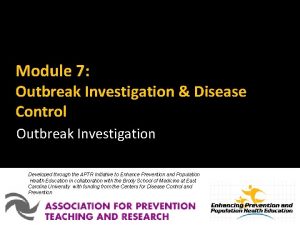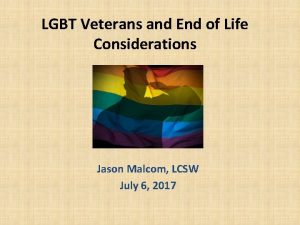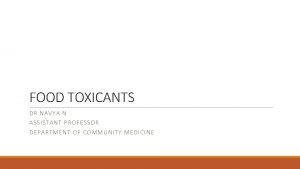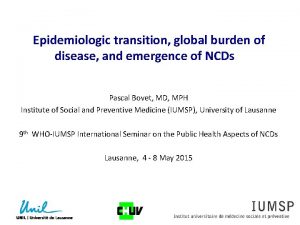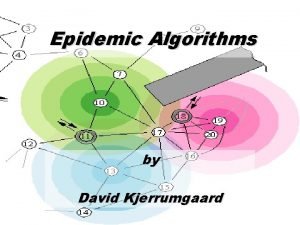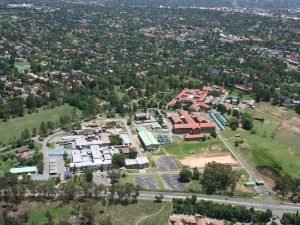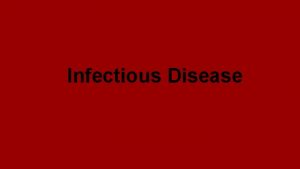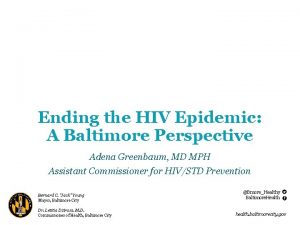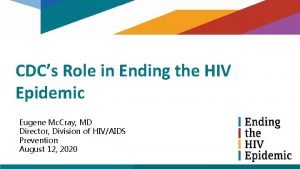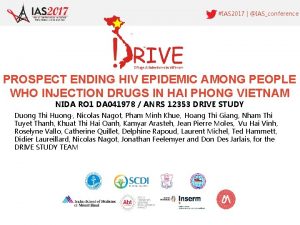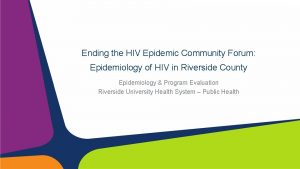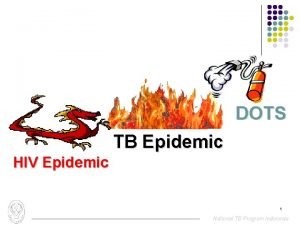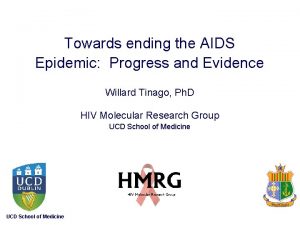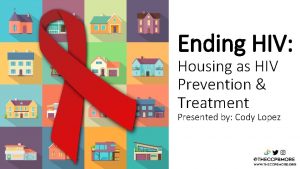Ending the HIV Epidemic Progress Amid a Pandemic












- Slides: 12

Ending the HIV Epidemic: Progress Amid a Pandemic Ryan White HIV/AIDS Program Clinical Conference August 12, 2020 Dr. Laura Cheever, MD, Sc. M Associate Administrator HIV/AIDS Bureau (HAB)

Session Outline • • EHE Plan Overview and the HRSA Contribution § Laura W. Cheever, MD, Assoc. Administrator, HIV/AIDS Bureau, HRSA CDC’s Part of the EHE Plan § Eugene Mc. Cray, MD, Director, Division of HIV Prevention, CDC Getting to Zero+: A View from Baltimore § Victoria Cargill, MD, Assistant Commissioner, HIV Services, Baltimore City Health Department Telehealth: Lessons from COVID with Implications for EHE § Magda Houlberg, MD, Chief Clinical Officer, Howard Brown Health

Four Pillars of Ending the HIV Epidemic Diagnose All people with HIV as early as possible. Treat People with HIV rapidly and effectively to reach sustained viral suppression. Prevent New HIV transmissions by using proven interventions, including preexposure prophylaxis (Pr. EP) and syringe services programs (SSPs). Respond Quickly to potential HIV outbreaks to get needed prevention and treatment services to people who need them. 3

Geographic Locations of Ending the HIV Epidemic Initiative Efforts focused in 48 counties, Washington, DC, and San Juan, PR, where more than 50% of HIV diagnoses occurred in 2016 and 2017, and seven states with substantial rural HIV burden. County contributing to 50% new HIV diagnoses in 2016/2017 State with disproportionate rural burden in 2016/2017 4

Identifying the Challenges Ahead People with HIV in care People newly diagnosed with HIV People with HIV out of care • Improve viral suppression rates • Decrease disparities • Enhance linkage to care • Enhance engagement in care • Expand reengagement in care • Improve retention in care 5

HRSA HAB Ending the HIV Epidemic (EHE) Resources JURISDICTIONS COMMUNITY ENGAGEMENT SYSTEMS COORDINATION TA AND CAPACITY BUILDING • FY 2020 $70 million • Ryan White HIV/AIDS Program Parts A and B • Technical Assistance Provider • Systems Coordination Provider • AIDS Education and Training Center (AETC) Program for workforce capacity development 6

HRSA’s Health Center Program Funding Overview • Primary Care HIV Prevention (PCHP) Supplemental Funding § $54 million awarded to 195 HRSA-funded health centers with service delivery sites in the geographic locations identified by the EHE. § Recipients: dually-funded (HRSA’s Bureau of Primary Health Care and RWHAP) health centers or health centers with MOUs with RWHAP sites PCHP OBJECTIVES Engage new and existing patients to identify those at risk for HIV Increase patients tested for HIV Increase patients who receive prevention education and clinicallyindicated Pr. EP Increase linkage to HIV treatment Enhance/Establish partnerships to support HIV prevention activities Within 8 months of award, add staff to support HIV prevention services and Pr. EP 7

COVID-19 Lessons to Accelerate EHE Response • • Adoption of telemedicine o Reaching those out of care o Improving retention rates o Concerns about the “digital divide” Extension of medication refills o 90 day fills o Increased home delivery Self Testing o HIV, STIs Reassessing processes o Eligibility and recertification 8

HRSA EHE Listening Sessions – Locations April • Baltimore, MD • • • Jackson, MS Houston, TX Austin, TX Phoenix, AZ Los Angeles, CA Oakland, CA Sacramento, CA San Francisco, CA Columbia, SC Atlanta, GA July August • • • Cincinnati, OH Indianapolis, IN Kansas City, MO Birmingham, AL Miami, FL • • • Philadelphia, PA Louisville, KY Frankfort, KY • Oklahoma City, OK • • Little Rock, AR Memphis, TN September October November 9

HRSA EHE Listening Sessions – Key Themes • Addressing mental health, substance use, incarceration, transportation, and homelessness is critical to reach people not in care • Planning for EHE needs to include communitybased organizations, community health centers, people with HIV, and new partners • Supporting training for clinic staff to ensure that culturally responsive and supportive experiences happen for clients (for testing, care, and Pr. EP) • Addressing stigma, health education, and criminalization laws 10

HRSA EHE Listening Sessions – Key Themes (cont. ) • Addressing workforce shortages for medical providers, and mental health and substance use providers • Leveraging community strengths by hiring community health workers, peer navigators, peer specialists, etc. • Assessing eligibility and intake processes and forms for testing and care • Allowing jurisdictions to be innovative and to adapt and adjust as they learn 11

Contact Information Laura Cheever, MD, Sc. M Associate Administrator HIV/AIDS Bureau (HAB) Health Resources and Services Administration (HRSA) Email: Lcheever@hrsa. gov Phone: 301 -443 -1993 Web: hab. hrsa. gov Connect with HRSA Learn more about our agency at: www. HRSA. gov Sign up for the HRSA e. News FOLLOW US: 12
 Endemic epidemic
Endemic epidemic Toxinq
Toxinq Aids epidemic
Aids epidemic Gondhli millet
Gondhli millet Endemic epidemic
Endemic epidemic Doctors attributed the epidemic to the rampant
Doctors attributed the epidemic to the rampant Epidemiological transition model
Epidemiological transition model Epidemic broadcast trees
Epidemic broadcast trees Physical progress and financial progress
Physical progress and financial progress Mathalicious pandemic answer key
Mathalicious pandemic answer key Covid 19 pandemic summary
Covid 19 pandemic summary Who pip framework
Who pip framework Who pandemic phases
Who pandemic phases
